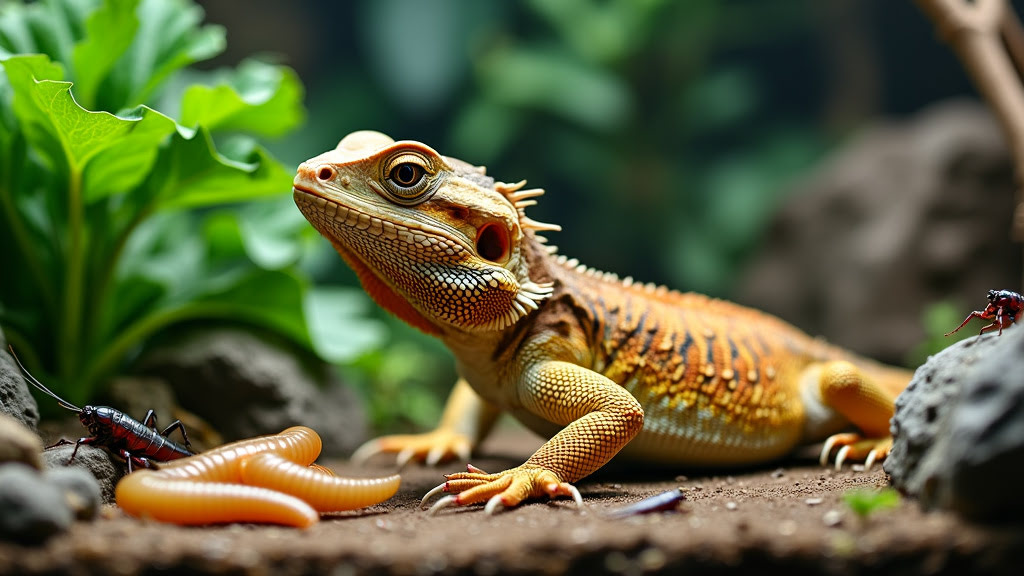Welcome, fellow reptile enthusiasts! Today, we’re discussing an exciting topic about caring for bearded dragons. We all want our scaly companions to thrive, and diet plays a crucial role in their well-being. Have you ever considered feeding them silkworms? Can bearded dragons eat silkworms safely? Let’s delve into this!
Understanding Bearded Dragon Diets
Before addressing silkworms specifically, it’s essential to understand what a bearded dragon’s diet should include. These fascinating reptiles require a balanced mix of protein, vegetables, fruits, and supplements as they grow.
Breakdown of Nutritional Needs
Protein
Protein is especially important for young bearded dragons. Common sources include crickets, dubia roaches, and, importantly, silkworms.
Vegetables
Collard greens, dandelion greens, and squash are excellent vegetable choices. Always remove any uneaten veggies to maintain their freshness.
Fruits (in moderation)
Fruits such as strawberries and blueberries should be given occasionally due to their high sugar content. A healthy dragon is one that doesn’t have a sweet tooth!
Supplements
Calcium and vitamin D3 supplements are essential to prevent metabolic bone disease. Make sure to dust insects with calcium powder to ensure your dragon receives adequate nutrition.
Personal Insights
From my own experience, my bearded dragons, Dug and Dugina, adore collard greens and the excitement of chasing crickets. Variety is crucial for preventing boredom and ensuring balanced nutrition. Avoid common errors like overfeeding fruit or skipping supplements.
What Are Silkworms?
Let’s talk about silkworms! These little guys are not only for silk production; they can also be a nutritious food option for our bearded dragons.
Overview of Silkworms
Silkworms begin as eggs, then become larvae (the stage we feed our dragons), and finally transform into moths. They are primarily bred for their silk but are highly nutritious.
Nutritional Profile
Silkworms are rich in protein, low in fat, and boast an excellent calcium-to-phosphorus ratio, making them a fantastic choice for reptile health.
Comparison to Other Common Food Items
When compared to crickets and mealworms, silkworms offer more protein and contain less chitin (the hard shell that can be difficult to digest). Though crickets and mealworms are popular, silkworms might deserve a place in your dragon’s diet as well.
Benefits of Silkworms in a Bearded Dragon’s Diet
Nutritional Advantages
Silkworms are packed with protein, which is perfect for growing dragons. They are low in fat, helping your dragon stay fit, and their excellent calcium-to-phosphorus ratio aids in preventing metabolic bone disease.
Personal Experience
When I introduced silkworms to Dug and Dugina, it felt like watching a dragon feast in a fairy tale. I noticed an increase in their energy levels and overall health. They eagerly devoured the silkworms, as if saying, “Where have these been all our lives?“
Risks and Considerations
Potential Risks
Although silkworms are highly nutritious, excessive protein can cause health issues like kidney problems. Be mindful of potential allergies or digestive issues, though these are uncommon. Maintaining a varied diet is key to balanced nutrition.
Personal Cautionary Tales
One time, feeding Dugina too many protein-rich foods led to minor health problems. A quick visit to the vet helped us get back on track. Always monitor any changes in your dragon’s health and behaviour.
How to Safely Introduce Silkworms
Sourcing Silkworms
Obtain silkworms from reputable suppliers to ensure they are healthy and safe. You might even try breeding your own; it’s both fun and rewarding.
Feeding Tips
Start with small amounts to observe your dragon’s reaction. For an adult bearded dragon, feeding 3–4 silkworms per session, a few times a week, is advisable. Adjust the quantity based on your dragon’s size and activity level.
Health Monitoring
Watch for signs of dietary issues, such as lethargy, changes in stool, or visible weight changes. Regular health check-ups are essential, and stay alert for any signs of trouble.
Other Dietary Considerations
How Silkworms Fit in a Balanced Diet
Silkworms are a great addition but should be part of a varied diet. Include fresh vegetables and occasional fruits, and continue offering other insects like crickets and dubia roaches.
Personal Feeding Schedule
In my feeding routine, Mondays and Fridays are cricket days, Wednesdays are for silkworms, and veggies are given daily. I dust everything with calcium powder three times a week. Keep a log of your dragon’s food intake and adjust as needed.
Conclusion
To sum up, a diverse and balanced diet is crucial for your bearded dragon’s well-being. Silkworms offer numerous benefits, such as high protein and an excellent calcium-to-phosphorus ratio. However, they should be part of a varied diet. Monitor your dragon’s reaction and make dietary adjustments as necessary. Always consult your vet for specific advice.
Are you curious about adding silkworms to your dragon’s diet? Share your experiences and tips with us! Let’s build a community of well-fed, happy dragons.
Additional Resources
- Recommended Reading
- Contact Information for Exotic Pet Vets
- Personal Recommendations and Reviews
FAQs
Can juvenile bearded dragons eat silkworms?
Yes, juveniles can safely eat silkworms. Adjust portion sizes for their smaller stature and higher protein needs.
How often should I feed silkworms to my bearded dragon?
For adult dragons, feeding silkworms 2–3 times a week is a good starting point. Monitor your dragon and adjust as necessary.
Are there any foods that should be avoided when feeding silkworms?
Avoid feeding avocado, rhubarb, and other toxic foods. Minimise sugary fruits to prevent dietary imbalances.
While personal experience is valuable, always consult a veterinarian regarding any specific health concerns or dietary changes for your bearded dragon.
For more detailed information on the best diet for bearded dragons, visit our internal page.

